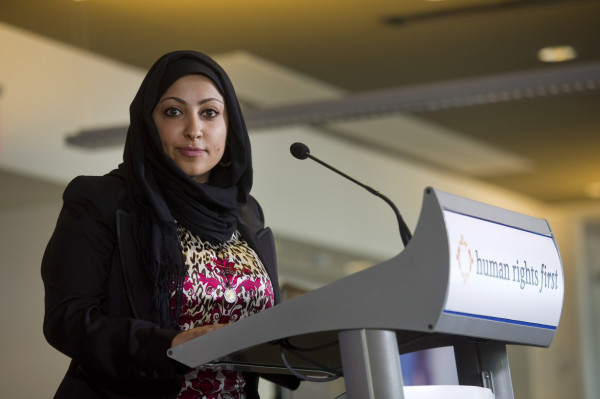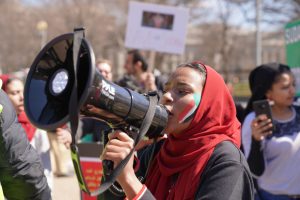by Derek Davison
If actions speak louder than words, then Bahrain’s decision to arrest the prominent human rights activist, Maryam al-Khawaja, on Aug. 29 demonstrates that, despite promises to the contrary, the island kingdom has no real intention of cleaning up its poor human rights record. How, or whether, the United States responds to this latest event will show just how far America is prepared to go in advancing a worldwide human rights agenda.
Bahrain’s ruling family, the Sunni al-Khalifa dynasty, has long been accused of oppressing the country’s Shia majority in favor of the Sunni minority. Most Shia are prevented from holding prominent government posts and from advancing economically, a situation that has been called “sectarian apartheid.” Shia Bahrainis are also barred from serving in the country’s security forces, which are manned by many Sunni immigrants who serve in exchange for Bahraini citizenship—a policy meant not only to ensure that security forces reliably comply with orders to oppress the Shia, but also to artificially shift Bahrain’s sectarian demographics by bringing in large numbers of Sunnis from abroad. Compounding sectarian tensions is the fact that Bahrain, unlike its Gulf neighbors, lacks the kind of oil and gas resources that could fund a strong social welfare system. As a result, high youth unemployment rates and levels of income inequality have contributed to strong feelings of discontent overall, but particularly among the already disenfranchised Shia population.
These tensions boiled over in February 2011 when protesters gathered in the capital, Manama, and were met by a quick and violent response from the al-Khalifa government. Bahraini police, already known for using torture to extract confessions from prisoners, had killed at least 55 protesters as of last February, a number that has undoubtedly grown as clashes have continued, though the government’s restriction on reporting makes finding an accurate estimate of the dead very difficult. Jay Romano’s vivid first-hand account of Sitra offers a picture of a country where entire Shia villages are virtually at war with the government, their buildings covered with posters of those who have been killed by security forces—an image of devastation belied by Manama’s veneer of placid modernity.
Bahrain conducted its own review of the 2011 crackdown and has previously pledged to improve its human rights record, but independent reviews have found that little actual progress has been made. Khawaja’s arrest at Manama Airport, and the subsequent decision to strip her of her Bahraini citizenship, is another sign of Bahrain’s failure to carry out its own promises.
Khawaja is the daughter of Abdulhadi al-Khawaja, himself a prominent human rights activist and co-founder of the Bahrain Center for Human Rights, and one of Bahrain’s most prominent political prisoners. He was arrested on April 9, 2011 by Bahraini police, who beat him into unconsciousness in the process, and was reportedly subjected to severe abuse while in custody. In June of that year Khawaja, along with seven others, was sentenced to life imprisonment by a military tribunal on charges of attempting to overthrow the government in a trial that received international criticism for its shady procedures and lack of transparency.
Maryam al-Khawaja gained prominence for her reporting on the 2011 uprising and crackdown as well as through her own work with the Bahrain Center for Human Rights. She was attempting to return to Bahrain see her father who is in grave medical condition after going on hunger strike on Aug. 26 to protest the Bahraini government’s continued use of arbitrary arrest and sham trials to suppress the protest movement (this is the second hunger strike he has undertaken since being sentenced). She has been charged with assaulting police officers at the airport and will stand trial on Sept. 6. Americans for Human Rights and Democracy in Bahrain (AHRDB) and the Bahrain Institute for Rights and Democracy (BIRD) have criticized her arrest.
“The Bahraini government continues to promise the international community that it is committed to the implementation of reform laid out in the BICI and the UPR recommendations, but the arbitrary detention of Maryam al-Khawaja is a clear indication of how seriously they take such promises,” said Sayed Alwadeai, BIRD’s head of advocacy.
“Unfortunately, it is clear that the Government of Bahrain has no desire for living up to their international commitments to respect and protect human rights, and the international community must hold the government accountable,” he said.
Bahrain’s continued intransigence on its human rights record poses something of a test for the United States, but it is unlikely that the arrest of Maryam al-Khawaja, or the dire condition of her father, will arouse any serious American response. Bahrain, after all, expelled US Assistant Secretary of State for Human Rights, Democracy and Labor, Tom Malinowski, in July simply for meeting with leaders of the opposition Wefaq party, and earned only a mild rebuke from the US government.
It is easy for the United States to criticize poor human rights records when it comes to adversaries like Iran, but it is far more difficult to challenge allies in a similar fashion. It’s unlikely that America will demand reform in the home of an important naval base like Bahrain, or another close ally, Qatar, where manual laborers live and work under conditions that amount to a form of slavery. We have already seen that Washington will do no more than offer empty criticisms of Israel even as that country’s government targets civilian populations in Gaza. However, until the US is prepared to turn the same critical lens on its allies that it so frequently turns on its rivals, its commitment to the cause of human rights cannot be taken seriously.
Photo Credit: Human Rights First






If you want to know what “human rights” are Derek I suggest that you watch National Geographic. Whatever “rights” nature gives you are real. Whatever “rights” governments give you are the fads of the time and place.
The term “human rights” was put together by Empire because it sounds nice. Who doesn’t like “human”, and who doesn’t like “rights”? They are supposed to hook into “international law”, which is a construct of Washington, New York and London to expand its reach globally under an international, pseudo legal structure.
Human rights nor international law were never intended to apply to any major player within Empire. What ever happened to the “human rights” of the Iraqis who Bush and Blair blew to smithereens? Do you see Blair coming to the docks at the ICC at the Hague?
And you never will.
What happened to the human rights of the millions of children in the US who are homeless each year? Or the millions of children living in extreme food insecurity, in a country that is the Saudi Arabia of food?
Nah, Maryam has simply ingested way too much Empire propaganda media and has taken the fiction of “human rights” way too seriously. All of the countries of the Gulf are a part of Empire, albeit only on its third tier.
And Derek remember this human rights abuses don’t happen within Empire, just countries Empire doesn’t like.
Well put Robert, couldn’t agree more.
Just goes to further prove how sectarian differences lie at the heart of the problems in the Middle East.
Perhaps I’m the only one here, but it seems that after the latest Gaza “shooting fish in a barrel”, that the talking heads are daring to point their little pinkies at the big hypocrite in all this, sort of like the carnivorous actions of one, then many Piranha attaching. Changing sides in the equation, or just plain covering ones backside. It’s going to take more than just nibbling around the edges, but in the end, they will still be members of the group that couldn’t shoot straight, or the dustbin of history on the wrong side.